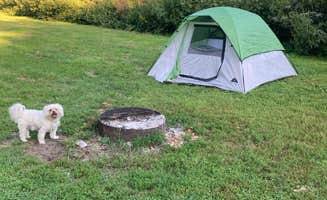Primitive camping near Alma, Wisconsin offers year-round access to forested terrain across the Mississippi River in Minnesota. Most dispersed sites sit at elevations of 600-1200 feet, with spring and fall providing the most comfortable camping weather. Winter camping requires additional preparation as temperatures can drop below 0°F, while summer brings humidity and temperatures averaging in the 80s.
What to do
**Trail exploration: Connect to multiple hiking systems at Richard J Dorer Memorial Hardwood Forest where campers can access trails directly from their sites. "There are a few spaces with views you can hike in to but I opted for a spot next to my car. And ideal spot for a one nighter. I stopped here after a 12 hour drive got set up and even walked the trails for a few miles before bed," notes one visitor.
**Bike access camping: Reach campsites without a vehicle on the area's trail network at Root River Canoe Campsite. "There is a bike trail that had a fork in the road that leads right to it someone could walk, hike, canoe or kayak to access this campground," explains a reviewer who has visited the site multiple times over the years.
**Wildlife observation: Early mornings offer opportunities to spot deer, turkeys, and various bird species throughout the forests. The natural surroundings provide habitat for native wildlife, particularly in less-frequented areas of the forests.
What campers like
**Uncrowded experience: Many sites see minimal use, especially during weekdays and off-peak seasons. At Root River Canoe Campsite, one camper observed the site "was used and built by Boy Scouts ages ago. It's still exist, however the river changed course and is further away than it once was."
**Cost savings: Free camping options exist throughout the area with no permits required at most locations. Campers appreciate the ability to stay without reservation fees or entrance costs.
**Campsite structures: Some sites feature unexpected amenities like Zumbro Bottoms State Forest where visitors have noted, "This area is off a low maintenance dirt road. It is best to come in from the south as sometimes the gate on the river bridge to the north is closed. There is a parking spot near a known dispersed camping site with easy vehicle access next to it."
What you should know
**Winter access limitations: Many forest roads close seasonally or become impassable after heavy precipitation. Check road conditions before departing, especially for remote sites.
**Variable site conditions: Facilities may be unmaintained or deteriorating at some locations. Root River Canoe Campsite shows signs of age with limited upkeep. A reviewer noted, "It's free to stay here, and doesn't seem like people really camp here anymore. Has a pit toilet, picnic tables, and a fire ring."
**Restroom facilities: Where available, expect basic pit toilets without running water. Bring hand sanitizer and toilet paper as supplies are not guaranteed at these remote locations.
Tips for camping with families
**Opt for drive-in sites: Choose locations with parking adjacent to the camping area when traveling with children or significant gear. Richard J Dorer Memorial Hardwood Forest offers drive-in options that simplify setup with kids.
**Pack water supplies: Even at sites listing drinking water as available, supply can be inconsistent. Bring containers with sufficient water for your group's entire stay.
**Consider difficulty levels: Some hike-in sites require significant effort. "The hike up the hill to the overlook is a daunting one. We used a collapsible wagon to haul all the supplies up the hill," explains one camper about their experience at Richard J Dorer, indicating preparation needed for families attempting more remote sites.
Tips from RVers
**Size restrictions: No dispersed camping areas near Alma accommodate large RVs or fifth wheels. Small campervans under 20 feet will have the most options for accessing primitive sites.
**Road clearance requirements: Forest access roads may have uneven surfaces, washouts, or low-hanging branches. Vehicles with higher clearance fare better, particularly after weather events.
**No hookups available: All dispersed camping in this region requires self-contained operation. Bring sufficient water, manage waste appropriately, and prepare for no electrical connections at primitive sites.


